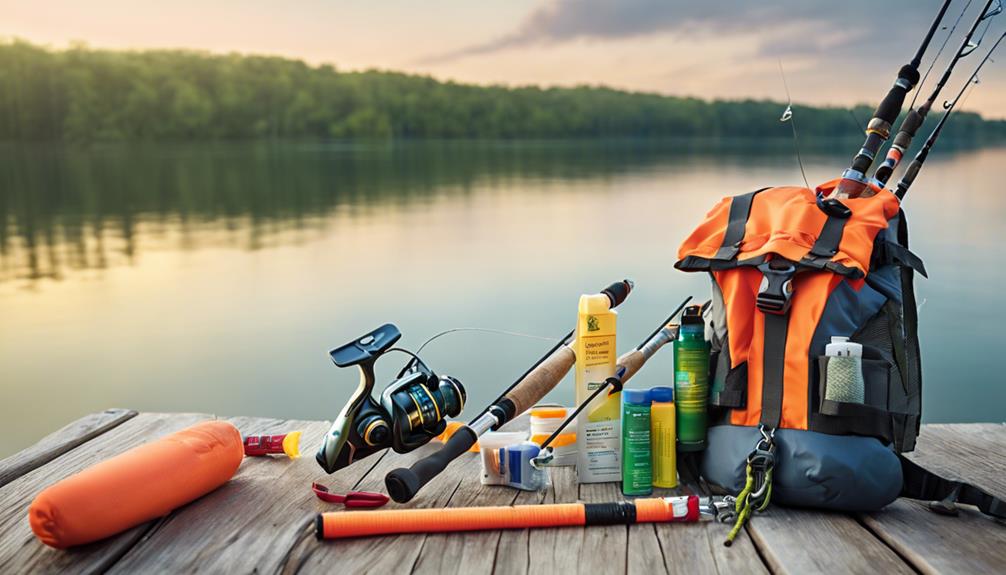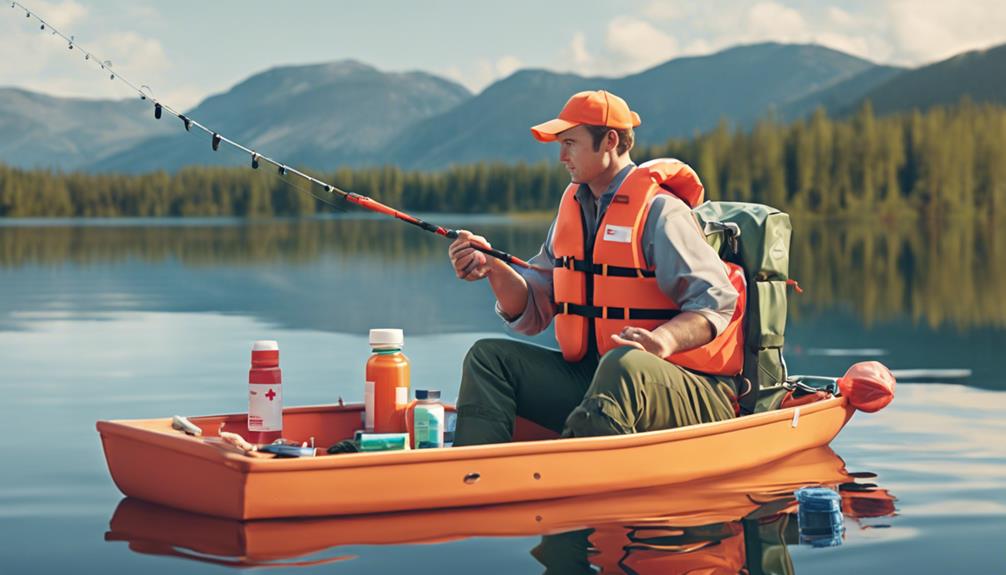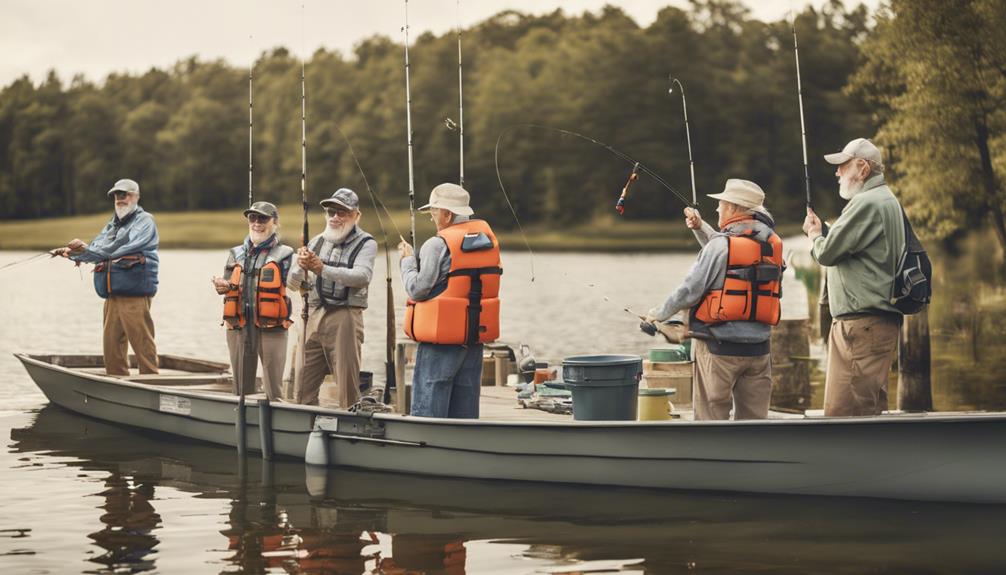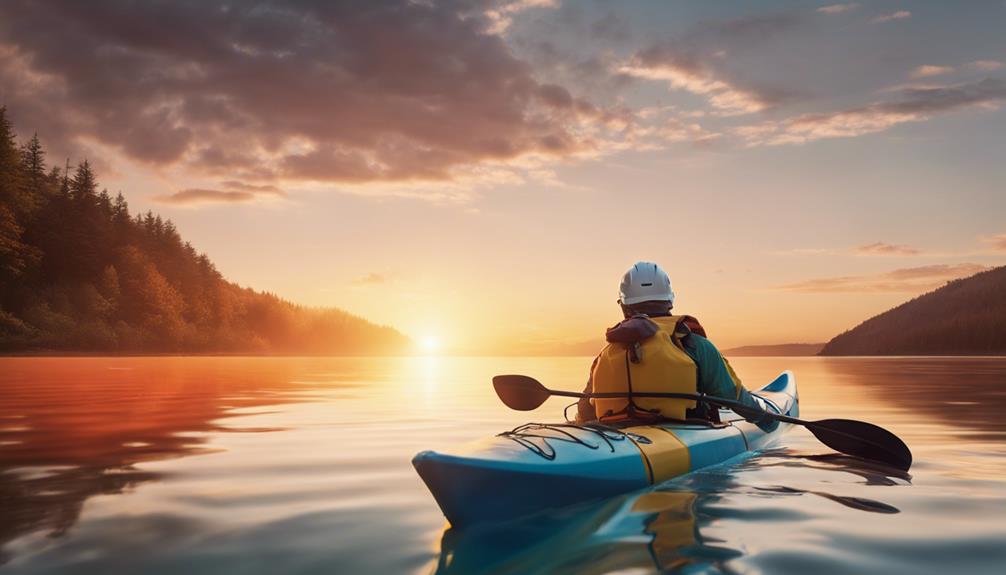When it comes to fishing, think of safety gear as your shield against unexpected challenges on the waters. From the right equipment to understanding your surroundings, each tip plays a crucial role in ensuring a secure fishing experience.
But what's the key to staying safe while reeling in your catch amidst the tranquility of nature's embrace? Let's explore these 15 essential guidelines that will not only enhance your fishing skills but also guarantee a worry-free angling adventure.
Wear Appropriate Safety Gear
Wearing the necessary safety gear while fishing is crucial for your protection and well-being. Before heading out, it's essential to take safety precautions seriously. One of the most important safety precautions is to always wear a properly fitting life jacket, especially if you'll be fishing from a boat or near deep waters. In case of an accident, a life jacket can be a lifesaver. Additionally, make sure to have a first aid kit handy in case of minor injuries.
When it comes to gear essentials, wearing polarized sunglasses is more than just a fashion statement. These sunglasses help reduce glare off the water, allowing you to see more clearly into the depths below. This can be crucial for spotting underwater obstacles or observing fish movements. Furthermore, wearing non-slip footwear is vital, especially on wet surfaces like boat decks or riverbanks. This simple gear essential can prevent unnecessary slips and falls, keeping you safe throughout your fishing trip.
Be Mindful of Weather Conditions
When fishing, it's essential to stay mindful of weather conditions to ensure your safety and enjoyment on the water. Checking the weather forecast before heading out is crucial. Weather can change quickly, and being caught unprepared in a storm can be dangerous. Stay alert for any sudden shifts in weather patterns while you're out on the water. Darkening clouds, strong winds, or sudden drops in temperature can all be signs of impending bad weather.
Always have a plan in place for what to do if the weather takes a turn for the worse. It's a good idea to carry a portable weather radio or have a weather app on your phone to stay updated on any weather alerts or warnings in your area. If you hear thunder or see lightning, it's time to get off the water immediately. Lightning is a serious threat when fishing, so don't take any chances.
In addition to checking the weather before you head out, keep an eye on the sky while you're fishing. If you notice dark clouds moving in or sudden changes in wind speed or direction, it's time to head back to shore. Your safety should always be the top priority when fishing, and staying aware of weather conditions is a key part of ensuring a safe and enjoyable fishing experience.
Practice Proper Casting Techniques
To improve your fishing skills, mastering proper casting techniques is essential. It not only helps you cast your line farther and more accurately but also minimizes the risk of getting tangled or hooked on nearby objects. Here are some tips to help you practice proper casting techniques effectively:
- Maintain a Proper Stance: Before casting, ensure you have a stable and balanced stance. Keep your feet shoulder-width apart and distribute your weight evenly to prevent losing balance while casting.
- Focus on Your Equipment: Regularly check your fishing equipment for any signs of wear and tear. Make sure your fishing line isn't twisted or damaged, and your reel is functioning correctly. Proper equipment maintenance can prevent casting mishaps.
- Practice Smooth Acceleration: Avoid jerky movements when casting. Start slowly and accelerate smoothly as you release the line. This technique will help you achieve better casting distance and accuracy.
- Follow Through: After releasing the line, continue your casting motion smoothly. This follow-through motion helps in controlling the line and bait placement accurately in the water.
Keep a First Aid Kit Handy
Ensure you have a well-stocked first aid kit readily accessible while fishing to address any minor injuries or emergencies that may arise. First aid essentials such as bandages, antiseptic wipes, gauze pads, adhesive tape, scissors, tweezers, pain relievers, and any necessary personal medications should be included. In addition to these basics, consider adding items like insect repellent, sunscreen, and a thermal blanket for emergency preparedness.
Accidents can happen unexpectedly, so having a first aid kit on hand can make a significant difference in how effectively you can respond to injuries. Whether it's a minor cut from a fishing hook or a slip resulting in a bruise, being prepared with the right supplies can help you manage the situation promptly and prevent further complications.
When setting up your fishing gear, designate a specific spot for your first aid kit that's easily accessible in case of an emergency. Make sure all members of your fishing party know where the kit is located and how to use its contents. Regularly check the kit to ensure that supplies are up to date, and replace any items that have been used or have expired. By prioritizing safety and emergency preparedness, you can enjoy your fishing trips with peace of mind knowing you're equipped to handle unforeseen situations.
Stay Hydrated and Protect From the Sun
Remember to stay hydrated and protect yourself from the sun while fishing to ensure a safe and enjoyable experience. Fishing under the sun for extended periods can lead to dehydration and sunburn, which can quickly turn a fun day into a painful one. Here are some essential tips to help you stay safe and comfortable:
- Stay Hydrated:
- Drink plenty of water throughout your fishing trip. Dehydration can sneak up on you, especially when you're focused on reeling in that big catch. Take regular water breaks to keep yourself hydrated and energized.
- Apply Sunscreen:
- Before heading out, make sure to apply a generous amount of sunscreen with a high SPF rating. Reapply every few hours, especially if you've been sweating or in the water. Protecting your skin is crucial to prevent painful sunburns.
- Wear Protective Clothing:
- Opt for lightweight, long-sleeved shirts, hats, and sunglasses to shield yourself from the sun's harmful UV rays. Clothing acts as an additional barrier against sunburn and helps regulate your body temperature.
- Seek Shade:
- When possible, take breaks in shaded areas to give your skin a rest from direct sunlight. This can prevent overheating and reduce the risk of sun-related illnesses. Remember, staying safe in the sun allows you to enjoy fishing for many more days to come.
Beware of Slippery Surfaces
Watch out for slippery surfaces while fishing to prevent accidents and injuries. Fishing spots can often have wet rocks, algae-covered docks, or mossy areas that can be dangerously slick. To stay safe, watch your step and stay cautious at all times.
When moving around your fishing area, be mindful of where you're stepping. Take slow and deliberate steps, especially when near the water's edge or on uneven terrain. Wet surfaces can be deceivingly slippery, so it's crucial to maintain your balance and avoid unnecessary risks. Remember, a fall on a slippery surface can lead to serious injuries and ruin your fishing trip.
To prevent accidents, wear appropriate footwear with good traction. Shoes with non-slip soles can provide better grip on wet surfaces and reduce the chances of slipping. Additionally, using a walking stick or fishing pole for added stability can help you navigate tricky areas more safely.
Always be aware of your surroundings and any potential hazards. Even familiar fishing spots can change with weather conditions, so stay vigilant and adapt to the current environment. By watching your step and staying cautious, you can enjoy your fishing experience without the worry of slipping and getting hurt.
Know Your Fishing Environment
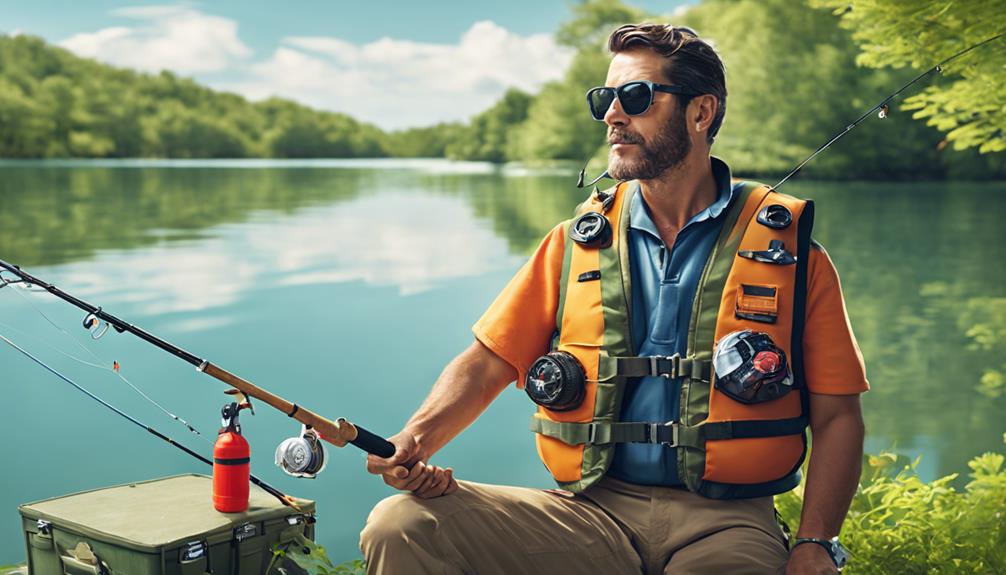
Explore the fishing environment thoroughly before casting your line to familiarize yourself with potential obstacles and opportunities. Knowing your fishing environment is crucial for a safe and successful fishing experience. Here's how you can ensure you understand the environment better:
- Explore Local Wildlife: Take note of the wildlife in the area, such as birds, fish, or mammals. Understanding the ecosystem can help you avoid disrupting natural habitats and stay safe from any potentially dangerous creatures.
- Understand Water Currents: Be aware of the direction and strength of water currents in the fishing spot. This knowledge can help you position yourself correctly and avoid being swept away unexpectedly.
- Identify Potential Hazards: Look out for any submerged rocks, branches, or other obstacles that could pose a risk while fishing. Being aware of these hazards can prevent accidents and ensure a smooth fishing experience.
- Check Weather Conditions: Stay informed about the weather forecast for the day. Sudden changes in weather can impact your safety while fishing, so it's essential to be prepared for any weather-related challenges.
Respect Wildlife and Nature
Respecting wildlife and nature while fishing is essential for maintaining the delicate balance of the ecosystem and ensuring a sustainable environment for future generations. Wildlife conservation should be at the forefront of your mind when engaging in this activity. It's crucial to practice ethical fishing by adhering to catch limits, releasing undersized fish, and properly disposing of any waste to protect the natural habitats of aquatic species. By being mindful of the impact your fishing practices have on the environment, you contribute to the preservation of diverse ecosystems and help safeguard the biodiversity of our planet.
Environmental stewardship is another important aspect to consider while fishing. As an angler, you play a significant role in habitat protection. Avoid damaging sensitive habitats such as coral reefs, seagrass beds, or wetlands. Be cautious with your equipment to prevent littering and entanglement hazards for wildlife. By respecting the natural surroundings where you fish, you contribute to the longevity of these ecosystems and ensure they remain healthy for future generations to enjoy.
Frequently Asked Questions
What Are Some Common Fishing Injuries That Can Occur, and How Can They Be Prevented?
Common fishing injuries like hook wounds, cuts, and slips can be prevented with safety precautions. Proper handling of equipment and fish reduces the risk of accidents.
Knowing emergency procedures for injuries like hook impalement is crucial. Always wear appropriate gear like gloves and footwear to protect yourself. Stay aware of your surroundings and be cautious while handling sharp objects.
Following these guidelines will help ensure a safe fishing experience.
Are There Any Specific Safety Precautions to Take When Fishing in Saltwater Versus Freshwater?
When fishing in saltwater versus freshwater, remember to pack appropriate safety equipment. Differences exist in the marine environment, so be prepared. Ensure you have proper gear for each setting.
Familiarize yourself with emergency response protocols for both scenarios. Stay informed and know how to react in case of any mishap. Safety first, always be ready for any situation when out on the water.
How Can Beginners Identify and Avoid Potential Hazards While Fishing?
When fishing as a beginner, identifying hazards and avoiding risks is crucial. Be aware of your surroundings and watch out for slippery rocks or uneven terrain. Stay cautious of changing weather conditions and always wear appropriate gear like a life jacket.
Avoid fishing near fast-moving currents or deep waters if you're unsure. Keep an eye out for wildlife and potential underwater obstacles. Stay safe by being alert and prepared at all times.
Is There a Recommended Protocol for Handling and Releasing Fish Safely?
When handling and releasing fish, remember to follow proper techniques for their safety. Ethical practices involve minimizing harm to the fish by handling them gently and swiftly. Adopting catch and release protocols ensures the fish's well-being after being caught.
Always prioritize safety precautions to prevent injuries to yourself or the fish during the handling process. By following these guidelines, you can enjoy fishing while respecting the environment and the fish population.
What Steps Should Be Taken in Case of an Emergency While Fishing in Remote Locations?
If an emergency happens while fishing in remote areas, remember these essential steps:
Prioritize emergency communication to seek help.
Apply wilderness first aid if needed.
Utilize survival skills while waiting for assistance.
If necessary, initiate a search and rescue plan or signal for help.
Being prepared and knowing what to do in emergencies can make a significant difference in ensuring your safety while fishing in remote locations.
Conclusion
Overall, staying safe while fishing is essential for a successful and enjoyable experience. By following these tips and being prepared, you can minimize risks and focus on catching fish.
Remember to wear the proper gear, stay aware of your surroundings, and respect nature. Whether you're fishing in a lake, river, or ocean, safety should always be a top priority.
So grab your gear, hit the water, and fish safely!
